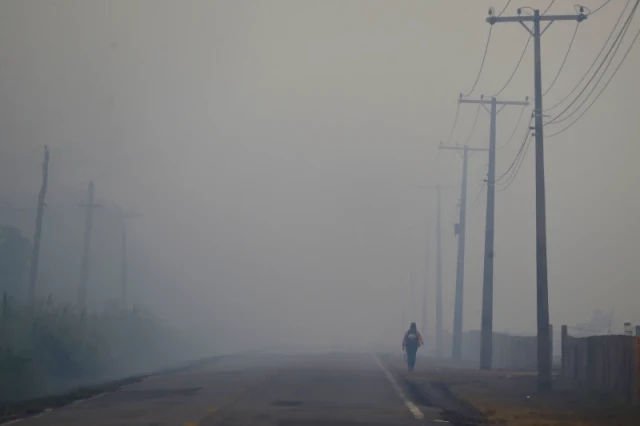President Luiz Inácio Lula da Silva has pledged to pave the BR-319 road in the Amazon, despite concerns from environmentalists and some in his own government that it could significantly increase deforestation in the world's largest tropical forest and contribute to climate change.
The road connects the states of Amazonas and Roraima to the rest of the country, and runs parallel to the Madeira River, which is at its lowest recorded level, disrupting cargo navigation.
Lula acknowledged the potential risks but said the government could not leave two capitals isolated and would proceed with the utmost responsibility, without specifying what steps would be taken to prevent increased deforestation.
Hours later, he supervised the signing of an agreement to pave 52 kilometres (32 miles) of the road, and vowed to commence work before his term concludes in 2026 on the most contentious segment of the road,
The BR-319 road is a 400-kilometre (249-mile) that stretches through ancient forest.
A permit for the longer stretch was granted under Jair Bolsonaro, Lula's far-right predecessor, who supported development in the Amazon and weakened environmental safeguards.
In July, a federal court suspended the permit in a lawsuit filed by the Climate Observatory, a network of 119 environmental, civil society, and academic organisations.
The Climate Observatory lamented the move as Lula made clear his plan to move ahead during his visit on Tuesday after appealing the suspension.
A public policy coordinator with the group, Suely Araújo, said, "Without the forest, there is no water, it's interconnected.
"The paving of the middle section of BR-319, without ensuring environmental governance and the presence of the government in the region, will lead to historic deforestation, as pointed out by many specialists and by Brazil's federal environmental agency in the licensing process."
Lula has sought to portray himself as an environmental protector, and deforestation has slowed significantly since he took over for Bolsonaro.
But he has also struck out at times against pressure from richer nations on preserving the Amazon, an invaluable resource for the planet in storing the carbon driving atmospheric warming, and did so again on Tuesday.
"The world that buys our food is demanding that we preserve the Amazon. And why? Because they want us to take care of the air they breathe. They didn't preserve their own lands in the last century during the Industrial Revolution," he stated.
Brazil is enduring its worst drought ever recorded, with 59% of the country under stress, an area about half the size of the U.S.
In the Amazon, rivers' low levels have stranded hundreds of riverine communities, with shortage of potable water and food.
Lula announced a wide distribution of water filters and other measures during his visit to the region.
Meanwhile, most of Brazil has been under a thick layer of smoke from wildfires in the Amazon, affecting millions of people in faraway cities such as Sao Paulo, Brasilia and Curitiba and reaching as far south as Argentina.




















